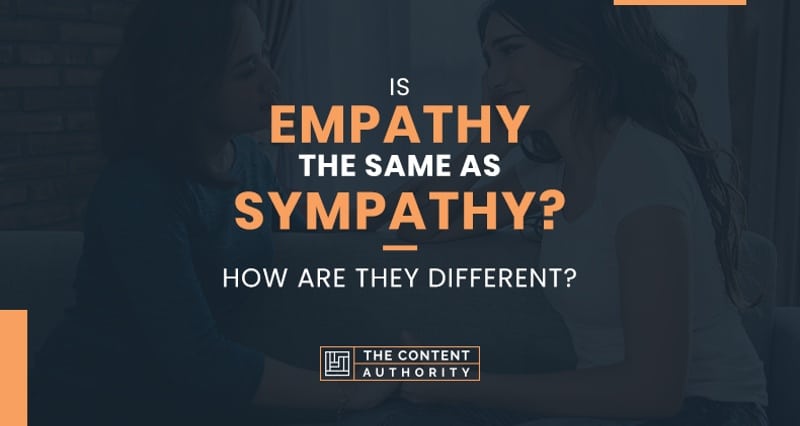At times, you might commonly use sympathy or empathy in a sentence thinking that they mean the same when they are used in a sentence. But many of the proficient linguists will silently correct you based on their knowledge and understanding. So isn’t empathy the same as sympathy? Well,
Sympathy and empathy both mainly relate to the feelings and emotions of others. However, empathy and sympathy, with a contextual exception, are two completely opposed words that relate to the feelings of others in a contrasting manner and context even when they are used in the same sentence.
You might find this a shock and would want to know how these two words are completely different. Not only that, but you might also be hesitant to know when and where to use these words in a sentence. So, let’s jump right to the point and explain how these two are used.

“Sympathy” or “Empathy” How to Properly Use them In a Sentence?
You can ascertain yourself with this fact that most people do commonly face the same challenge in understanding how to use the word sympathy or empathy in their sentences. Consequently, this can make your sentence seem very peculiar in terms of meaning and understanding.
You need to know how to use both of these words and this can be done by first understanding the meaning of these words. The word “sympathy” actually addresses the feelings and emotions of the others based on their sorrows. Alternatively, you can say that it means feeling pity for the other person. For instance;
- He received many sympathies from everyone ever since his grandfather was sick.
- Her sympathy for Carla’s incident only resulted in disputes and arguments amongst the family members.
From the above illustrations, you may be able to understand how the word “sympathy” actually makes a more accurate and reliable sense when it is addressed with the feelings of others. Although sympathy reflects in the manner mentioned above, empathy, on the other hand, refers more to the understanding or the way another person can sense the emotion of others, either by personal experience or by having emotional intelligence and grasping how the other person feels like or is thinking like. For example,
- As he was a foreigner himself, he feels a great deal of empathy for all those travelers who left their homes.
- She showed no empathy for all the victims that were terrorized in the incidents.
Now from the above examples, it must have become clear for you that the words sympathy and empathy both sound different and that their use is different based upon their meaning. As both of these are nouns, they can be used in various manners in the sentences which are either as a subject or an object.
- Sympathy from her meant nothing to her family.
- James didn’t understand the pain his father was going through as he lacks empathy.
By knowing how to use these words in the sentences, you must have also wondered when to use such words in the various statements.
When Do We Use “Sympathy” or “Empathy” Properly In a Sentence?
Specifically, some people understand the know-how to use both of these words but you might face a confusing matter as to when to use such words. Reason being that you might still feel and consider that both of them closely hold the same meaning as the other and can be used as synonyms regardless of their clear difference.
However, this minute difference between the two is the actual reason why these words are generally used in contrasting situations. Generally, the word “Sympathy” is used when you are to show sorrow and feel the sorrows, misery, misfortune, and troubles of the others. A common instance of this would be when people respond to a sad incident as “My Sympathies!” For example,
- Her sympathies made Michelle explode with emotions at her father’s funeral.
Here, you must have also connected the dots regarding this that “sympathy” is mostly used when we are trying to express such sad feelings with another person, it is used in subjective situations. Whereas, in the case of “empathy,” the emphasis is on the foundation of understanding the pain of others from experience or senses. Also, when you put yourself in the situation of others, usually done in a more objective way, from experience or genuine understanding. An easy example of this is:
- He showed great empathy to her as he knew what it was like living without a father.
In the above example, the word “empathy” is expressing a person’s full understanding of the situation and responding to it in a manner that also allows them to stay indulged in. It is a way to connect and understand the common or mutual feeling that is present between each other.
By now, you might feel some type of confusion to properly understand this, so we’ll go ahead and explain some key points to easily remember the differences between the two words.

Is There an Easy Manner to Clear Up the Confusion Between Sympathy and Empathy?
Although, after reading through, you might feel that your knowledge regarding the differences between the two words is still vague. Most probably because these words stir up multiple disoriented images in the mind that it becomes hard to keep up with their conclusive differences.
There are a few keys and easy to remember points that will help you in every situation whenever you face any doubt.
1. Empathy is polite, Sympathy is personal
In every case, when you will express sympathy for someone else, you will address the way you share the troubled emotions with others. This means that you will share the sorrow connected to that situation, the distress or the struggle. However, empathy is a more generalized feeling that drives towards action. If you see someone in distress or sad, you understand the feeling because you have felt this way too, so you empathize. This makes you approachable and personable but still detached from the situation. For instance;
- She showed her sympathies over the death of my stepson.
- Her empathic behavior is the main reason why many clients discuss their business crisis with her.
In the very first scenario, “sympathy” was part of a feeling that was contributed with others but in the second scenario, “empathy” became a resonating quality that allows one to become connected with the others through common understanding thus it becomes an actionable quality of oneself.
2. Sympathy Shares Troubles but Empathy Shares Emotions
The other clear-cut difference between the two is that sympathy always relates to troubles or feeling sorry for someone else. But the same case doesn’t follow for empathy as empathy involves experiencing other emotions as well. These emotions could be different in different scenarios based on the context. For instance,
- He received a tremendous amount of sympathies from his colleagues on the news of his mother’s death.
- Kylie had no empathy for the people who were working for her in the factory.
In the first scenario, “sympathy” inadvertently gave its direct reference for the feeling of sorrow that was shared with others whereas “empathy” reflected the feelings of the people who could be experiencing different emotions in the second scenario.
There are other ways that can allow you to identify the differences between the two words when they are used in a sentence. However, by going over these two main to the point differences you won’t face any issue in understanding how both these words differ from one another.
Even though these points may seem to the point and concise but it doesn’t mean that there isn’t any exception or case where both of these words would give similar meanings. There are points when both of them resonate with the same meaning.
Is There Any Case Where Both These Words Can be Used in Similar Context?
It is critical and highly important that you remember that there is an exceptional case when both of these words can be used in a similar context. This context can be when both of them highlight the same feeling or action. In such a case, the use of any or both words can be accurate and appropriate. For instance:
- Her sympathetic behavior was the main reason why she didn’t feel sad about the loss of her pet.
- Her empathetic behavior was the main reason why she didn’t feel sad about the loss of her pet.

In both of the examples, the common feeling and action made it reasonably appropriate to use either one of those words in the sentence. With all these to the point and easy to remember, in addition to the exceptions will surely allow you to easily determine the appropriate context of the sentence to use either the word “sympathy” or “empathy”.
There are other examples and instances where these words can be used in a similar context but this main one will allow to grab the complete understanding from all aspects.
So, It Means That “Sympathy” and “Empathy” are Different?
Yes, you must remember that both words, besides some exceptions, are different which is seen by the use of these words in the sentences. Thus, by following such rules and having the proper understanding, you will be able to use these in proper judgment every time.
Shawn Manaher is the founder and CEO of The Content Authority. He’s one part content manager, one part writing ninja organizer, and two parts leader of top content creators. You don’t even want to know what he calls pancakes.

